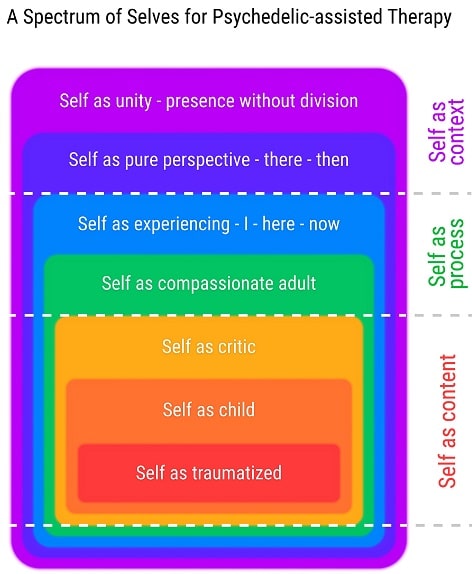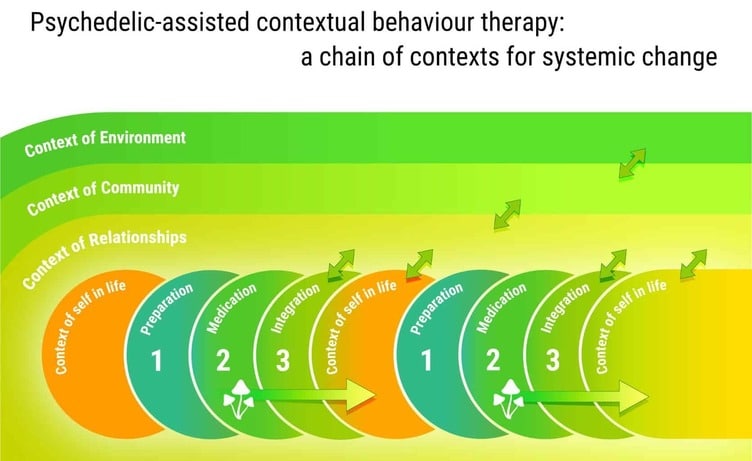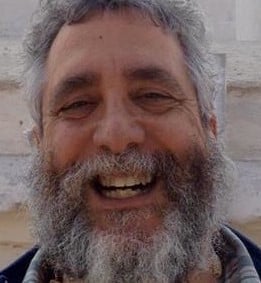Expanded ACT for Psychedelic-assisted Therapy: Integrating trauma-focused ‘parts’ work with systemic change
£1,800.00
2025 Dates:
- Online: 13-14th Feb
- Catalonia, Spain: 1-6th March (arriving 6pm on 1st)
Places limited to 16 (Book early to avoid disappointment)
Location:
- At a retreat centre with sea view an hour north of Barcelona, near Can Domenec (5 days and nights). 2 days preparatory training online. 1pm-9pm BST (UK)
Contribution:
Facilitators:
Lead by Henry Whitfield PhD candidate
with Dr. Robert Krause DNP
and Dr. Larry Leeman
Join the community of other psychedelic therapists learning and working together through regular peer supervision
A two + five day training experience to learn a new integral model of psychedelic-assisted therapy on the Catalonian coast

View of the sea from the grounds of the retreat/training venue in Catalonia, Spain
Who’s this course for?
This training is aimed at mental health professionals with a training in psychological therapy, who wish to learn ACT-consistent applications of psychedelic-assisted therapy. You may already work with psychedelics, helping attendees of psychedelic ceremonies to prepare for and integrate their psychedelic experiences. This training is designed to equip you with many ways to deepen and consolidate the gains that are possible with psychedelic approaches when underlying trauma and systemic barriers to change are thoroughly addressed.
This training is unique with its integral view that resolves old tensions that have fragmented psychotherapy theory and practice for decades. It offers a seemlessly integrated approach of ACT processes, ‘parts work’ (IFS), shame work (FAP) and a titrated exposure for trauma (Traumatic Incident Reduction-TIR). This new combined methodology opens possibilities to even highly experienced practitioners (see testmonials below). The processes behind two or more of these approaches can often be integrated into a single instruction for the participant at any stage of psychedelic-assisted therapy. These interventions are tailored to a wide range of psychedelic therapy challenges to enable a trauma-focussed ACT-consistent approach to systemic change, as described in the recent Spectrum of Selves paper (see https://www.frontiersin.org/articles/10.3389/fpsyt.2021.727572/full).
Informed with high-density data collected from over 60 participants attending our retreats (a study designed to reduce relapse and deepen gains in psychedelic-assisted therapy), this training highlights what we know has been helpful in producing stable psychedelic therapy gains (post 6-12 months). It integrates Somatic Internal Family Systems and Traumatic Incident Reduction with Acceptance and Commitment therapy as a process-focussed core-theoretical model, to offer a versatile, multi-modal framework. This includes a pallet of six degrees of directive/non-directiveness. Using such a pallet context-sensitively, we can resolve the directive/non-directive debate in psychedelic therapy.

ACT brings the overarching framework of evolutionary and behavioural science principles, as well as a shortcut to accessing hidden fears. Within this framework, TIR and IFS offer additional ‘vehicles’ for implementing Contextual Behavioural Science principles thoroughly and compassionately.
You will learn multiple interventions that align precisely with the Spectrum of Selves approach, adapted throughout the three phases of Psychedelic-assisted therapy.
The curriculum includes:
-
- A 150 page bound manual to support you during and after the training.
- A checklist for tailoring your personal training needs.
- A process-focussed approach to treatment planning, aimed at addressing key nodes in a person’s network of interacting symptoms. How might centrality and accessibility of a network symptom offer a way forward?
- ‘Multiple-function’ interventions that apply multiple models in a single action.
- Two thirds of a certificated training in TIR, a structured approach to Trauma/PTSD comparable to EMDR in its thoroughness, yet more precise and consistent with mindfulness and ACT. If you wish to become qualified with the full certificate in TIR, this can be done with one additional day training (available online on request).
- ACT-informed Parts work to address inner conflict between your different selves.
- A protocol for differentiating between healthy and unhealthy self-story/narcissism.
- A protocol for processing intense psychedelic experiences and re-accessing perspectives and insights from the trip.
- Expanding and reinforcing new behavioural repertoires that flow from newly gained perspectives – seamlessly interconnecting the three phases of psychedelic therapy.
- Overcoming complex/long-term trauma (often more accessible post psychedelic).
- Working Somato-cognitively – reawakening feeling in the body
- Mapping and reinforcing systemic change.
- Predictors of long-lasting benefits in psychedelic therapy and how to implement them.
- ‘Inner healing intelligence’ versus varying degrees of person-centredness/ active-directiveness (and when to do which)
- Parts work for malevolent and benevolent parts/entities
- A defusion protocol for when the mind gets in the way during a dosing session.
- Shame work as a shortcut to our deeper self-concept issues (informed with Functional Analytic Psychotherapy (FAP))
- Perspective switching exercise for transcending the polarities of the mind
- Behaviour change coaching for increasing alignment in a person’s life.

Schedule:
Days 1-2 (online Feb 13-14th*, 1 pm – 9 pm GMT): Engineering a new psychedelic therapy of the future with an interoperable tool set. TIR for re-accessing and processing psychedelic experiences and related traumatic memories. If you already have TIR training you could skip this session.
Invitation to exchange sessions with peers before arriving in Spain.
In Catalonia, Spain (1-6th March) Arrive 6 pm for dinner on 1st March, leave by 6pm on 6th. All meals and accommodation included.
Days 3-4: ACT and the Spectrum of Selves – from shame to the ‘reverse compass’ for accessing our deeper fears, exploring the voices and behaviours of our different parts. Understanding the ACT core processes from a ‘parts’ point of view. For a taster of this see this invited speaker conference presentation: https://youtu.be/7PjiTJhTJjc
Day 5: Inner work aligned with outer systemic behaviour change. Getting ready to bring the barriers into the work.
Days 6-7: Practicum of ACT expanded with trauma and parts work through the three phases of psychedelic therapy. Your chance to practice with feedback the protocols and principles that you personally need the most feedback on.
Monthly supervision included for 3months
Internship and mentoring as well access to our ongoing learning community.

About the facilitators

Henry J. Whitfield
MSc (CBT), ACBS peer-reviewed ACT trainer, MBACP, Advanced Traumatic Incident Reduction Trainer,
Henry Whitfield is a psychotherapy trainer and psychedelic therapy researcher, having collected years of data through psychedelic retreats that explored new ways of combining psychotherapy processes with psilocybin. He is an Association of Contextual Behavioural Science (ACBS) Peer-reviewed Acceptance and Commitment Therapy trainer, an Accredited Advanced TIR (PTSD therapy) Trainer and Cognitive Behavioural Psychotherapist (MSc – CBT), and Visiting Researcher at Regent’s University – School of Psychotherapy and Psychology.
For over seven years Henry ran and supervised brief therapy for PTSD projects for Victim Support and Mind in London gun crime hot spots, using CBT and TIR. Henry has also trained over 1500 psychological therapists since 2003, supervising mental health professionals in the NHS for ACT and Trauma work. He lead the development of new ways to learn ACT skills efficiently, offering one of the first ACT skills programs ever in 2007. He is also a passionate integral thinker, publishing journal articles and book chapters on the integration of therapeutic models including, REBT-mindfulness, ACT-TIR-CBT, Person-centred-TIR. His psychedelic plant medicine path and ACT leanings helped him to work on collapsing the polarities that divide our field such as 'psychodynamic' vs 'cognitive-behavioural'. He has written, co-written and edited training manuals for ACT, TIR and FAP (relational psychodynamic). Now he focuses his research on understanding pathways to lasting psychotherapeutic change through all phases of psychedelic therapy. He is also author of a new model of psychological flexibility A Spectrum of Selves, tailored to a psychedelic therapy context published 2021 in Frontiers in Psychiatry.

Dr Robert Krause
Robert Krause DNP APRN-BC is the founder and Director of Clinical Services at Centered PLLC in New Haven, CT. His work involves clinical practice, education and research. He has been in practice for 27 years currently treating adults with a wide range of presentations from those with seriously and persistently mental illness, trauma, depression, and comorbid diagnosis to couples and families.
As an educator Dr Krause has been faculty at the Yale’s Schools of Medicine and Nursing, Quinnipiac University, Western Connecticut State University, and The Graduate Institute. He has also precepted graduate students in psychiatric nursing, and in professional counseling. He is currently a faculty member on a massive online course called “Addiction Treatment: Clinical Skills for Healthcare Providers” that has enrolled 62,000 students to date. He has facilitated or co-facilitates trainings for Ketamine Assisted Therapy including assisting Dr Phil Wolfson in a Ketamine training earlier this year. He has also contributed to the development of the Expanded ACT training for psychedelic therapy with Henry Whitfield. Additionally, he has supervised therapists for ketamine assisted therapy and has supervised therapists providing psychedelic therapy using psilocybin analogs for the Embark program of Cybin pharmaceuticals.
Dr. Krause has been trained in and utilizes a number of different therapeutic modalities including Trauma therapy (certificate from Harvard University), Acceptance and Commitment Therapy (ACT), Trauma Incident Reduction (TIR), Sex therapy (certificate from CIIS) and Psychedelic therapy ( from CIIS), Ketamine Assisted Therapy (Ketamine Training Center). He is a MAPS therapist.
Dr Krause was a co-author of Yale’s Manual for Psilocybin Assisted Therapy and was a therapist with the Psilocybin induced neuroplasticity in the treatment of Major Depressive Disorder at the Yale School of Medicine. Among publications he has co-authored are:

Dr. Larry Leeman
Larry Leeman MD MPH is a Professor in Family and Community Medicine; Obstetrics and Gynecology at the University of New Mexico School of Medicine and board certified in Addiction Medicine. He graduated from the California Institute of Integral Studies Program in Psychedelic Assisted Therapies and Research in 2021, has been certified in MDMA Assisted Therapy by MAPS and has trained in Ketamine Assisted Psychotherapy with PRATI and Polaris.
During a research sabbatical at the University of Wisconsin he participated in research with MDMA and Psilocybin. His current research focus in psychedelic assisted therapies at the University of New Mexico focuses on trauma and addiction, group psychedelic assisted therapy, and the use of MDMA for postpartum women with PTSD and opioid use disorder. He is currently completing his second year of training in Hakomi, a form of mindfulness certified Somatic psychotherapy and is in the Grof Holotropic Breathwork practitioner training program.